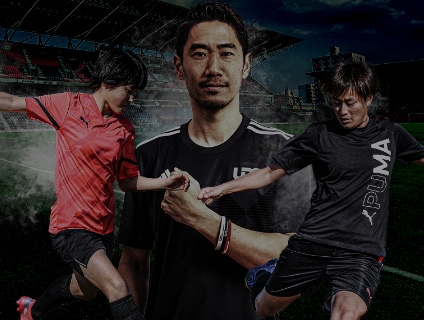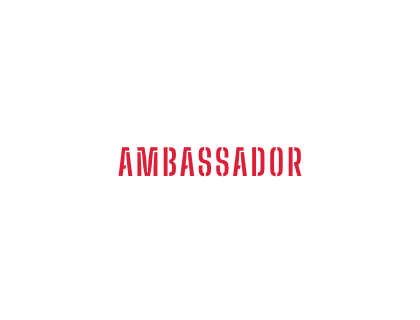
Akio Kogiku’s

Head Coach Akio Kogiku’s Conviction
“It’s Not a Smooth Road for All Players. I Coach with Patience and Love.”
Plant seeds, water them, and grow beautiful flowers
This 7 installment of “The Power of Cerezo Osaka Academy” will focus on Head Coach Akio Kogiku, who coaches Cerezo Osaka’s top team.
Having held both scouting and training positions, including discovering Shinji Kagawa, and having extensive experience in coaching developmental-age players, Coach Kogiku has been closely involved with players’ growth from a variety of positions. “I’ll always stay involved.” These words strongly convey Kogiku’s deep love and passion for coaching.
Akio Kogiku
 Head Coach
Head Coach
Born July 7, 1975. From Kobe, Hyogo. Graduated Takigawa Daini High School and Aichi Gakuin University, and became coach of Cerezo Osaka’s U-15 team in 1998. Subsequently served as head coach of Cerezo Osaka’s U-12/13 team, scout, training staff, top team coach, and head coach. Became head coach of the top team in August 2021.

- The theme of this interview is “The Power of Cerezo Osaka Academy.” From your perspective, what are the strengths and advantages of the academy?
- The academy has changed so much in the past few years, so I think now is the time to establish those. For many years, I've watched as we followed in Gamba Osaka’s footsteps. I think Cerezo Academy is growing at an incredible speed.
- We’ve actually caught up to Gamba, especially with Takumi Minamino–-although he’s playing for another team now–-and with players like Yoichiro Kakitani, Hotaru Yamaguchi, Takahiro Ogihara, and Kenyu Sugimoto. Even now, following the lead of Ayumu Seko, Cerezo is represented by players who carry the future of the club, like Ryuya Nishio, Hiroto Yamada, and Hinata Kida.
- This is very moving for me as someone who has seen the history of the club. Those who have been involved in training at Cerezo have put everything into sowing the seeds and watering them, and now we’re starting to see the results of that, seeing them bloom into beautiful cherry blossoms. I would like to modestly continue to grow more and more flowers and make them even more beautiful.
- Of course, this is a club-wide effort. It is important for us to be involved as top team staff, in addition to the training “organization.” Since we are finally seeing results, although it’s a slow and steady process, I think it’s important for all staff to keep pouring our passion into scouting and training activities.
- With the growth of the academy organization, Yahiro Kazama was appointed as the Technical Committee Chairman in 2021, and the academy is now working on more technique-focused initiatives.
- It’s a very strong message that we are sending out, that Cerezo’s training focuses on technique. We actually stay involved in both the top team and the players in training, and we are seeing the appearance of more and more kids whose technique is equal to that of the top team players. When we invite them to face off against the top team, they do very well with “stopping, kicking, and dribbling.” It gives a sense that our efforts are steadily producing result.
- In addition to the players you named earlier, you have produced a large number of pro footballers, including those in J2 and J3. What do you think is the reason behind this steady output of unique players?
- The biggest thing is that the club has been placing a focus on training for many years. The same goes for the U-23 team. We have all worked hard to train players like Shinji Kagawa and send them out into the world to represent Japan even beyond the bounds of the academy. In addition to Shinji, we sent a lot of players to Europe, including Takashi Inui, Hiroshi Kiyotake, Yoichiro Kakitani, Takumi Minamino, and last year, Tatsuhiro Sakamoto and Ayumu Seko.
- I think the biggest reason is that we have held onto our commitment to this without wavering as a club, even as head coaches and training staff change. Retired players have also helped us plant new seeds as leaders, and that history strengthens Cerezo and helps us develop better players. I think it’s a good cycle.
Amid frustration and uncertainty unique to players in training, we love and look out for our players
Coach Kogiku does not have a career as a pro footballer. Since being hired part-time as coach of the U-15 team in 1998, he has been involved with the club in various ways. He has been a scout, a coach, and a training staff.
He has experienced a large number of positions in 24 years. In the process, he has gained an unwavering conviction.

- You have experienced a variety of positions. What do you think is most important in training players?
- The most important thing when training players is loving them. I think that’s the key. Players in training will naturally make mistakes. They have other interests beyond football, they’ll get frustrated, they’ll make friends and get caught up in other things. There’s a lot going on. But we have to be patient with them during those times. There are a lot of different ways to show love, but I think the most important ones are always looking out for them, keeping an eye on them, and giving them a hand when they need it.
- In addition to just aiming to become pro footballers, academy players are going through the process of growing through football, and growing into adulthood both mentally and physically. While it’s naturally important to encourage growth in technical areas, educating them as humans is the most important thing. Parents also naturally want their kids to grow into respectable adults through football. I think one of the reasons that people appreciate Cerezo Academy is that we value human education above all other pillars of training.
- As an observer, it seems to me that training is a lot of groundwork, and patience and perseverance are important. What do you enjoy most about training?
- When I see players grow. Sometimes, there is sudden and rapid growth. We watch the players every day, so we know that they are improving, but there are moments when they perform well above expectations in an important match, or perform exceedingly well in a practice or game, and it’s like watching a dry sponge soaking up water. Those moments are the most joyous. The same goes for the top team. The happiest moment as a leader is seeing players grow before your eyes.
- You are known for discovering Shinji Kagawa during your time as a scout. What are the signs that a player is promising or talented, or a so-called “diamond in the rough”?
- Ultimately, it’s just a matter of how hard they’re willing to work to reach their goals, so I look for mental strength. I’ve seen a lot of wonderfully talented players who unfortunately couldn’t make it to the pros, or who got discouraged and quit early.
- In the end, it’s a matter of whether you can keep loving football and working toward your dreams, and that includes support from the family. I think those things are most important. Even if a leader tries to pull you up, it’s impossible if you aren’t motivated.
- You look at technique, but you also look at human nature.
- The players who end up representing Japan or playing internationally are those who “really loved football as a kid.” That can be said for all of them. They were competitive and held fast to their dreams. They didn’t think, “It would be nice if I could be a footballer.” They thought, “I’m definitely going to be this type of player.” They have dazzling thoughts like, “I’m going to be the ace in this club,” “I’m going to represent Japan,” or “I’m going to play internationally.” This was true for Shinji, Yoichiro, and Takumi.
- Nobody knows the future, but players who believe in their own futures rose to the top. Conversely, there were a lot of highly capable players who I wished had dreamed bigger. Those players unfortunately didn’t make it that far.
- It’s not just about technique.
- It’s really frustrating. We try to appeal to their mental state or stimulate them from a different angle, but it just doesn’t resonate for some players. It’s vexing, but if we give up there, those player’s potentials would end. It’s important to coach with patience and love. It doesn’t go smoothly for all players. We see how important it is to patiently watch over the players in all categories, whether they are on the top team or in the academy.
“Daily life is everything. I want them to live each day to the fullest.”
Kogiku was inaugurated as head coach of the top team on August 26 of last year. While he has experience as a coach, it was his first time taking on the challenge of head coach. He brought the team out of its slump and led it to contend for an ACL spot in this season’s J1 League, but ultimately finished in 5th place. Although they made it to the finals in the Levain Cup, they tasted the bitter tears of defeat against Sanfrecce Hiroshima. While the team did not win the title, it demonstrated clear improvement, bringing out the best in all of its members, from young players and mainstays to veterans and foreign players.
One of the goals that academy players should aim for is making the top team. I asked Kogiku what he wants to convey to the players as a coach.

- As head coach of the top team, how do you want to be seen by academy kids aiming to go pro?
- You can’t succeed in this world with only brilliant technique. Of course technique and tactics are important, but seeing players fight, run, and play to win for the team resonates with those who come to watch the games. We want our academy players watch a top team match and think, “I can’t win or go pro unless I play and run like this” or “Being able to play like this is what makes a professional player.”
- Right now, they are thoroughly developing their skills at the academy, so I want to show them a different view from a different stage, with players who can bring something extra to the table, and who can make sacrifices for the team. I want them to feel that.
- Do you have any words from your position of head coach of the top team for academy players aiming for the pros?
- I’ll say this until I’m blue in the face: “Daily life is everything.” I want them to always live every day to the fullest, and to do their best every day. This naturally goes for practice, but for other things as well. Only then will each one grow as an individual. As each individual grows, so does the team. We have to strengthen the team on both of those fronts. I also want to shout this out to the players in training.
- It’s never going to work if you only decide to put in an effort for big games, or when there’s a scout coming, or once you’re on the top team. It’s a matter of whether you can put in repeated effort, stay aware, and work toward your dreams every day.
Of course, being junior high and high school age, they naturally have periods of mental instability, but when they think about where they want to be and what they want to achieve in the future, their priorities become clear. What their future looks like depends on whether they can keep fighting through the tough times.
- So maintaining the desire to reach for your dreams is the most important thing to make it to the pros.
- It’s easy to say. It’s easy to want. But keeping at it and facing yourself every day is not so easy.
- That’s true for us, as well. I, too, try to remember the importance of this and live each day to the fullest. Of course I have worries, and I have wins and losses. I spend my days questioning myself. So I know how hard it is to keep going.
- Academy students in particular have to study as well, and balancing that is also important. I think players who do that right will make headway sooner or later. As an example with our players, Seiya Maikuma and Tokuma Suzuki went pro after four years of university. It might seem like a detour, but for them, those four years were necessary.
- There are some players don’t go pro directly from the academy, but after university or J3 and J2. I think there is potential in all players who keep believing in themselves. I really think this looking at the current college graduate players. Their unwavering strength, unwavering dreams, and the desire to achieve them are amazing. I think the ability of players like Tokuma to keep persevering even after leaving the academy, even when things get tough, can be attributed to mental toughness and strength, so I want our players to develop that. I want them to have that alongside technique and tactics.
- There are sure to be players promoted from the academy in coming years who will train under you as head coach. I’m looking forward to seeing it. This is already true for Sota Kitano.
- I want the youth players to get a sense of what is expected by the top team as soon as possible. I share time with the academy staff, including meetings, and we are always in communication. I think that carrying on for the sake of the kids’ futures and the future of the club is the best way to become an invincible club 30 or 50 years down the line.
- I know there are expectations for all players, but is there anything in particular that you expect of players who come out of the academy?
- Sure, because these players are here today because they have been loved by many people and the club. I want them to always be the face of the club, role models, and pillars of the club. I want to them to drive the club forward as leaders, in football as well as other aspects. I think that’s how players trained in the academy can give back to the club. I want them to demonstrate leadership with a continuous awareness of their roles as role models.
- Lastly, I have some questions about yourself. What is your driving force as a leader?
- Naturally, I’m happy when we win, but from the standpoint of head coach, it brings me joy to see each player giving their all to training every day, and being highly competitive in daily training. I’m happy when training goes well, and I’m grateful to them for doing a great job in training. That gives me a sense of fulfillment.
- Winning and losing is inevitable, but daily training is important.
- That’s what I focus on. It makes me truly happy that the players feel the same way. Players who compete in games naturally give their all to training, but it really brings me joy as head coach when I see players who have limited chances to compete, but still do their best every day without getting discouraged.
- What kinds of challenges do you want to take on in your own future, and what kind of coach do you envision becoming?
- It’s always been this way for me, but I don’t really think about the future. I always talk about giving it your all every day, and that’s how I’ve lived. At any rate, I want to create a bright future for Cerezo, and a strong Cerezo. That’s all I want.
- With this job, I don’t know how long I’ll stay the head coach for this club, but I want to keep doing my job every day with that in mind, and continue to hold that idea important. By the time I’m an old man, I want Cerezo to have been winning titles for a long time. I want to see it leading the J. League with multiple titles. I want to give my all every day, looking forward to that and helping Cerezo become such as club.

Cerezo Osaka, the power of the academy
 for the future
for the future
Cerezo Osaka Academy aims to develop world-class player. From Cerezo Osaka to the world.
"We want many beautiful flowers to bloom in the future."
We approach the driving force for such a future.


Athlete's

Why do top athletes keep challenging?
We approach the driving force of top athletes who continue to challenge.


 Agriculture Equipment
Agriculture Equipment Compact Equipment
Compact Equipment Utility Task Vehicles
Utility Task Vehicles Industrial Engines
Industrial Engines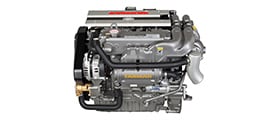 Recreational Marine
Recreational Marine Marine Commercial
Marine Commercial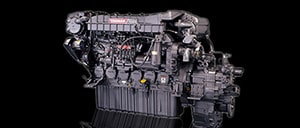 Propulsion Engines (High Speed)
Propulsion Engines (High Speed)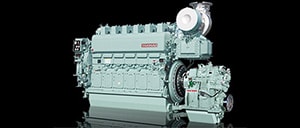 Propulsion Engines (Medium Speed)
Propulsion Engines (Medium Speed)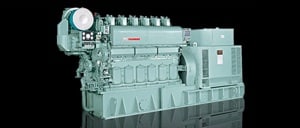 Auxiliary Engines
Auxiliary Engines SCR System
SCR System Dual Fuel Engine
Dual Fuel Engine Two-stage Turbocharging System
Two-stage Turbocharging System Electric Propulsion System
Electric Propulsion System Net Cleaning Robot
Net Cleaning Robot Energy Systems
Energy Systems Compact Power Products
Compact Power Products YANMAR RePower
YANMAR RePower Genuine Parts
Genuine Parts




